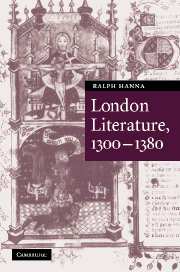Book contents
- Frontmatter
- Contents
- List of abbreviations
- In Thrall
- 1 English vernacular culture in London before 1380: the evidence
- 2 The ‘Old’ Law
- 3 Reading romance in London: The Auchinleck Manuscript and Laud misc. 622
- 4 Pepys 2498: Anglo-Norman audiences and London biblical texts
- 5 Anglo-Norman's imagined end
- 6 ‘Ledeþ hire to Londoun þere lawe is yshewed’: Piers Plowman B, London, 1377
- The end of early London literature
- Bibliography
- Index of manuscripts cited
- General index
- Cambridge Studies in Medieval Literature
1 - English vernacular culture in London before 1380: the evidence
Published online by Cambridge University Press: 22 September 2009
- Frontmatter
- Contents
- List of abbreviations
- In Thrall
- 1 English vernacular culture in London before 1380: the evidence
- 2 The ‘Old’ Law
- 3 Reading romance in London: The Auchinleck Manuscript and Laud misc. 622
- 4 Pepys 2498: Anglo-Norman audiences and London biblical texts
- 5 Anglo-Norman's imagined end
- 6 ‘Ledeþ hire to Londoun þere lawe is yshewed’: Piers Plowman B, London, 1377
- The end of early London literature
- Bibliography
- Index of manuscripts cited
- General index
- Cambridge Studies in Medieval Literature
Summary
In 1978, Ian Doyle and Malcolm Parkes inaugurated a new era of manuscript study. In their discussion of an early Confessio Amantis manuscript, Cambridge, Trinity College, MS R.3.2, they identified five important scribes sharing out the production, in London just after 1400. In the course of the study, Doyle and Parkes located the inception of a London book-trade that specialises in works of Chaucer and Gower and that is vitally important to understanding the development of English Literature as we know it. Their work has stimulated numerous daughter studies and squarely fixed critical attention on the development, in London, of a canon of English Authors.
Another comment by one of these scholars, now a few years later, fills in a further aspect of these seminal findings. Doyle, discussing ‘English books in and out of court’ (1983, 164–5), points out how few of them can be associated with the metropolis before 1400. And he comments upon the likelihood that before that date, the vernacular book-trade was in the main ‘provincial’ in nature. Although he notices the existence (and Chaucer's possible use) of ‘The Auchinleck MS’ (Edinburgh, National Library of Scotland, MS Advocates' 19.2.1), it appears in his account as a fairly isolated accident of London work.
But this was simply a moment of inattention on Doyle's part. He certainly knew, in his 1953 dissertation, more than anyone before or since about pre-1400 London books (and what will follow is pervasively indebted to his work).
- Type
- Chapter
- Information
- London Literature, 1300–1380 , pp. 1 - 43Publisher: Cambridge University PressPrint publication year: 2005

